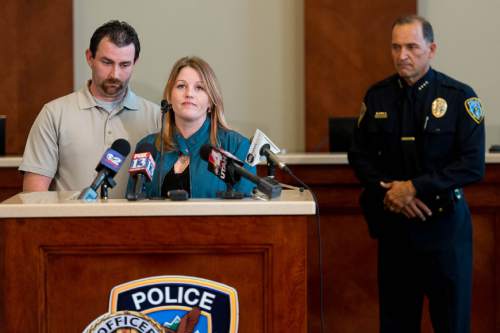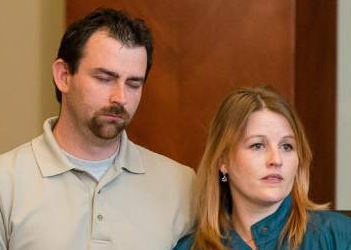This is an archived article that was published on sltrib.com in 2015, and information in the article may be outdated. It is provided only for personal research purposes and may not be reprinted.
A juvenile court judge ordered a now-17-year-old boy to stand trial Wednesday, ruling there is probable cause to believe that he beat 15-year-old Anne Kasprzak to death in 2012 and then lied to police about her death.
But the question remains of whether his case will remain in the juvenile court or if he'll be certified to stand trial as an adult.
The teen, who was 14 when Kasprzak died, is charged in 3rd District Juvenile Court with first-degree felony murder and second-degree felony obstruction of justice.
The Salt Lake Tribune generally does not identify juvenile defendants unless they have been certified to stand trial as an adult.
After three days of preliminary hearing testimony, Judge Dane Nolan bound the case over for trial, and on Wednesday afternoon, the certification hearing began for the accused teen.
Nolan also ruled Wednesday that portions of the teen's certification hearing that involve medical and psychological records would be closed to the public and media.
Over the next four days, Nolan will hear evidence about the juvenile's mental health and psychological evaluations, as well as other testimony. He will then decide whether the teen's case should stay in juvenile court or be moved to the adult court system.
Prosecutors have asked that the teen be tried as an adult because of the nature of the crime.
The victim's mother, Veronica Kasprzak-Bratcher, said Wednesday outside of court that she feels there is "progress" with the preliminary hearing bindover. She said their family hopes the teen is certified to stand trial as an adult.
"He made a pretty adult decision," she said. "This wasn't a one-time, accidental 'I lost my temper.' This was brutal. And that's a pretty adult decision to make."
Kasprzak-Bratcher said she's concerned if the case stays in juvenile court, the accused teen will be released from custody when he turns 21, in just over three years.
"He'll be 18 in three months," she said. "In three years, he'll be able to walk away. Annie didn't get to walk away."
Nolan also separated the teen's two charges Wednesday, ruling they do not qualify as a single criminal episode. The judge will make two separate adult certification rulings — one for the murder charge and another for the obstructing justice charge.
He added that the issue could be re-addressed if both counts are tried in adult court.
Deputy Salt Lake County Deputy Attorney Peter Leavitt on Wednesday said the evidence surrounding Kasprzak's slaying "clearly points in one direction" — her boyfriend — and that "if ever there was an adult crime committed, this is it."
Leavitt called the murder a "very sophisticated and complex crime" and argued that the defendant used the girl's assertions that the boy had gotten her pregnant as a motive for the homicide.
"He took that motive and created a plan to murder," Leavitt said.
He also pointed out that the defendant and the victim had called each other 10 times March 10, 2012, the night Kasprzak went missing, and that investigators later found the victim's blood on the defendant's shoes.
But defense attorney Christopher Bown responded, "At the end of the day, you have innuendo and false statements by a lot of people."
"There is nothing definitive that [the defendant] did this," Bown said. "They try to make him out to be a master murderer who didn't even have the common sense to get rid of the shoes."
While testifying Wednesday, Kasprzak-Bratcher said that after realizing Annie Kasprzak was not in their Riverton home March 10, 2012, she called her daughter's 14-year-old boyfriend to try to find her.
The call lasted under two minutes — the boy said he didn't know where the girl was, Kasprzak-Bratcher said.
"He told me that he had talked to her about five minutes ago," Kasprzak-Bratcher said. "And he said she was running away to California with L.J."
According to earlier testimony from a mutual friend of the two teens, Kasprzak had talked about a 17-year-old boy "L.J." that she liked. But police were never able to prove that this boy ever existed. Leavitt referred to him as a "phantom" and "Santa Claus' second cousin" during his closing argument.
A cellphone expert testified Wednesday that they were able to pinpoint where the defendant was when Kasprzak's mother called him at 9:01 p.m. that night.
He was near a pedestrian bridge west of 12600 South along the Jordan River Parkway in Draper, testified Sy Ray, who is the president of a company that specializes in police cellphone investigations.
That's the same bridge — upstream from where the girl's beaten body was later pulled from the river — where drops of Kasprzak's blood were found the next day.
Kasprzak-Bratcher said she looked directly at the defendant several times during her testimony — it was the first time she had sat across from him since he was at their home for dinner years ago.
"The idea that he at one moment could be calm and mellow and talking to me on the phone, and the next be killing my daughter and then calling me after, makes me sick," she told news reporters Wednesday.
Kasprzak had been telling her friends and family that she was pregnant with the boy's baby, though her stepfather testified Monday that she wasn't pregnant.
She wrote in a journal that she believed her boyfriend "did not want the baby that she told him she was carrying," according to a search warrant affidavit.
Kasprzak-Bratcher testified that she knew about the pregnancy rumor and that it wasn't surprising her adopted daughter would make up something like that. She sometimes lied, the mother testified, and at times would make up fictitious people.
"The idea of being pregnant was in some ways appealing to her," the mother testified. "... Her kind of fantasy about having this baby [was that] this is the one person who would love her unconditionally."
The defendant was arrested and charged in October 2014, at which time he was living in Colorado.





